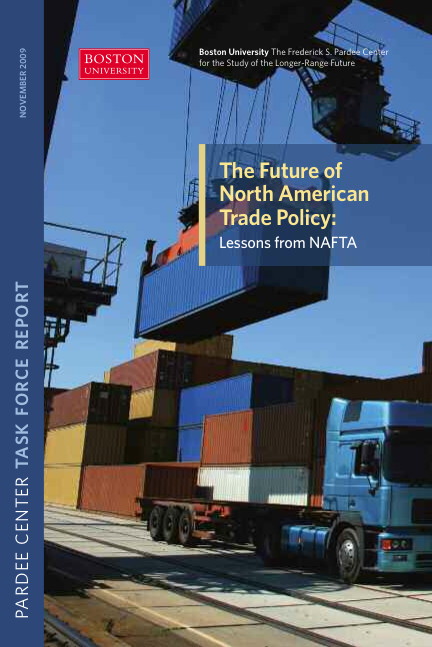Launch: Pardee Center Task Force Report on The Future of North American Trade Policy
 With the publication of the Pardee Center Task Force Report on the Future of North American Trade Policy: Lessons from NAFTA, the Frederick S. Pardee Center for the Study of the Longer-Range Future has launched a new publication series called Pardee Center Task Force Reports.
With the publication of the Pardee Center Task Force Report on the Future of North American Trade Policy: Lessons from NAFTA, the Frederick S. Pardee Center for the Study of the Longer-Range Future has launched a new publication series called Pardee Center Task Force Reports.
This Task Force Report written by an international group of trade policy experts calls for significant reforms to address adverse economic, environmental, labor and societal impacts created by the 1994 North American Free Trade Agreement (NAFTA).
Boston University’s Frederick S. Pardee Center for the Study of the Longer-Range Future convened the task force of experts (listed below) from the United States, Canada and Mexico who authored the report.
The report is intended to contribute to the discussion and decisions stemming from ongoing reviews of proposed reforms to NAFTA as well as to help shape future trade agreements. It offers detailed proposals on topics including services, manufacturing, agriculture, investment, intellectual property, labor, environment, and migration.
Fifteen years after NAFTA was enacted, there is widespread agreement that the trade treaty among the United States, Canada and Mexico has fallen short of its stated goals. While proponents credit the agreement with stimulating the flow of goods, services, and investment among the North American countries, critics in all three countries argue that this has not brought improvements in the standards of living of most people. Rather than triggering a convergence across the three nations, NAFTA has accentuated the economic and regulatory asymmetries that had existed among the three countries.
In 2008, candidate Barack Obama stated, “I voted against CAFTA, never supported NAFTA, and will not support NAFTA-style trade agreements in the future.” President Barack Obama has yet to demand renegotiation of NAFTA, but he has reiterated the need to rethink NAFTA and to change the template for U.S. trade agreements. Now in the wake of the financial crisis nations across the globe are re-thinking trade policy as well.
The Task Force recommendations detailed in the report include:
- NAFTA and the other trade agreements based on the NAFTA template need deep reform. These changes must go beyond the important but limited 2007 bipartisan agreement on modest reforms to labor, environment, and intellectual property provisions, which have been incorporated into recent agreements.
- Trade agreements need to address the asymmetries among trading partners with well-funded institutions. NAFTA established some important institutions, but they have been given neither the mandate nor the funding to allow them to help make Mexico a more equal economic partner.
- NAFTA’s services chapter may deter local, state, and national governments from implementing new laws to address climate change. NAFTA currently lacks assurances that good faith regulations to protect public welfare will not be challenged by private interests.
- Investment chapters allow foreign investors to sue governments for actions that impede profits, even if they are taken in the public interest. Reforms must limit the use of such measures, improve accountability, and remove the threat to governments.
- Reforms on the environment need to go beyond those in the US-Peru agreement, including key provisions on intellectual property, investment, services, and agriculture to raise environmental standards and improve enforcement.
- A trade agreement is no substitute for a coherent national development strategy. Developing countries should learn from Mexico’s experience that increasing trade and foreign investment will not alone generate dynamic economic development.
The Pardee Center Task Force on North American Trade Policy met at Boston University in March 2009 and developed the foundation for the report. The Task Force Members represent various disciplines, contributing many perspectives and a range of policy options for the longer-range future of trade in North America.
The Task Force Members, each of whom contributed a chapter to the report, include:
- Kevin P. Gallagher, Associate Professor in the International Relations Department at Boston University and a Pardee Center Faculty Fellow (Co-convener)
- Timothy A. Wise, Director of the Research and Policy Program at the Global Development and Environment Institute (GDAE) at Tufts University (Co-convener)
- Enrique Dussel Peters, Professor in the Graduate School of Economics at Universidad Nacional Autónoma de México (Co-convener)
- Rodolfo García Zamora, Professor of Development Studies at the University of Zacatecas, Mexico
- Kenneth C. Shadlen, Development Studies Institute, London School of Economics
- Robert K. Stumberg, Professor of Law at Georgetown University Law Center
- Gus Van Harten, Associate Professor at Osgoode Hall Law School at York University
- Christian E. Weller, Associate Professor of Public Policy at the University of Massachusetts, Boston.
Kevin Gallagher, Co-convener of the Report, will be presenting new research on reforming U.S. trade policies and NAFTA in Washington DC on December 8-11, 2009, building on ten years of research on Lessons from Mexico under NAFTA. He will be presenting to the Carnegie Foundation, the US Trade Secretary’s Office, the US House of Representatives and Senate Staff in Washington DC.